At Foonkie Monkey, we’ve established our remote-first work culture for several years now, and we understand its importance and its benefits for both our company and our employees.
For some years now, and thanks to modern technology’s global availability, the global work environment has reaped remote work’s benefits, and some companies have even started to encourage it. However, this past year, and thanks to COVID, this transition upended business operations abruptly and caused enterprises to send their employees home to work. This situation drove many enterprises to implement “tech or die” strategies to maintain operations running smoothly. Other organizations didn’t have the time to adapt their policies and methodologies to the shift. Most didn’t immediately have the tools to manage their staff or create a remote work culture with a clear trust-your-employees concept. The “direct supervision equals productivity” paradigm shifted forcibly, and COVID pushed the world into remote work…luckily.
Fast-forward to the present day, where the global work culture has massively shifted from in-office cubicle farms and centralized office spaces to work-from-home environments. Additionally, and albeit forcibly this past year, the number of people who work from home has increased by 140% since 2005. Now, companies understand the benefits of working from home, whether they’re across town or the other side of the world.
Now, remote work has become more than just a “cool to have” perk. Working from home is the norm for intelligent, competent companies and is here to stay, especially for large businesses. For example, last year, Twitter announced that its employees could continue to work remotely, even after the pandemic ends. The Gartner CFO Survey Reveals that 74% of CFOs and financial leaders intend to keep some employees working remotely permanently. Big companies are raising the bar and setting the example for everyone to understand that remote work isn’t just a benefit for employees but also for companies. In fact, there are very successful companies, like us, that have no office at all and where the entire workforce works remotely. With this in mind, we’d like other companies to understand the importance and the benefits of building a remote work culture, so we’re sharing some insights based on our journey.
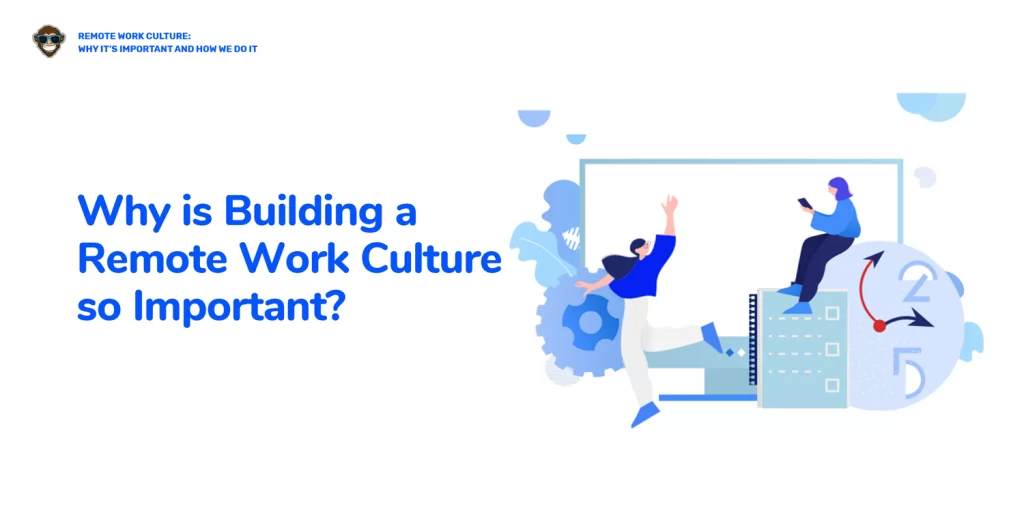
Why is Building a Remote Work Culture so Important?
One way to define remote work culture is the connection that coworkers experience between themselves and with the company, even when working at a distance. Members of a company that enforces a healthy remote work culture bond due to similar priorities, attitudes, and a sense of belonging that helps maintain remote work and makes it sustainable long-term. Whether your company chose remote work or was forced into it by the pandemic, it is paramount that you take the time and the effort to understand how to build and maintain a long-lasting remote work culture. You must realize that it affects how your employees and clients perceive you, ultimately determining your development company’s success.
Without a remote work culture, your employees, whether outsourced or full-time, will not be as productive, will not care about your company, won’t perform properly, and will slack, ultimately quitting or producing mediocre IT products. Don’t believe us? Check out this study where 83% of surveyed employees reported they are more productive when they work from home.
Since the beginning, one of the best decisions we made at Foonkie Monkey was to create an exclusively remote work environment. Our founders knew that people take insane amounts of time commuting from home to work and vice versa. Factor in the time and money they spend in traffic, sometimes crammed inside buses, and you can see why remote work represents a feasible solution for many issues regarding mobilization to office spaces. However, our founders didn’t take this decision lightly, and they knew they had their work cut out for them. They knew that when it comes to remote teams, building a solid work culture is crucial. They understood that remote workers could be more productive, creative, and engaged than an in-office team. And this has been the case for Foonkie Monkey for over ten years now.
Still, we have realized that most people don’t understand what it takes to foster a connection between a company and its employees while working remotely. Managing remote teams and bringing them together at a distance requires more structure, better multi-tasking skills, better communication tools, and a high level of transparency from everyone involved. Additionally, it also takes mindfulness, intention, and reimagining the traditional ways of how your employees will work together. It sounds complicated, but it takes less than you think; it’s way easier than managing an in-office team, and you don’t even need a physical company infrastructure that takes a considerable chunk of your income in rent, taxes, and utilities. Honestly, the benefits outweigh the challenges by miles.
Let’s take a look at some of the proven benefits of building a remote work culture.
• Higher productivity
It has been proven repeatedly that remote workers tend to be more productive due to schedule flexibility, lack of distractions or feeling supervised, no need to commute, and self-motivation. These benefits pay off according to a survey that found that remote workers had their performance boosted by 22%. Another study by PGi showed that 37% of tech professionals would take a 10% pay cut if their companies allowed them to work from home.
• Greater autonomy
Remote workers feel they have the freedom to make decisions, which empowers them, increases loyalty, enhances responsibility, and helps them take charge of their work.
• Distraction-free environment
In most cases, remote working allows employees to avoid productivity-wrecking interruptions inherent to the in-office workplace, such as commuting or dealing with office chatter.
• Increased employee loyalty
A study by Owl Labs shows that 74% of employees wouldn’t leave their employer if given the ability to work from home. Remote workers also feel a greater sense of belonging to their company and care more about their work’s impact on its success.
• Cost savings
Remote work cuts the need for rent, furniture, utilities, and other overhead costs that can bleed your company dry. Additionally, according to Forbes, allowing a worker to work from home can save a company more than $22,000 a year. It can also save employees $4,000 a year in commuting costs, plus countless hours they can spend on other high-value tasks.
With these benefits and the importance of enforcing a remote work culture in mind, how can you start? Here are five principles that work for us at Foonkie to build a solid, long-lasting remote work culture.
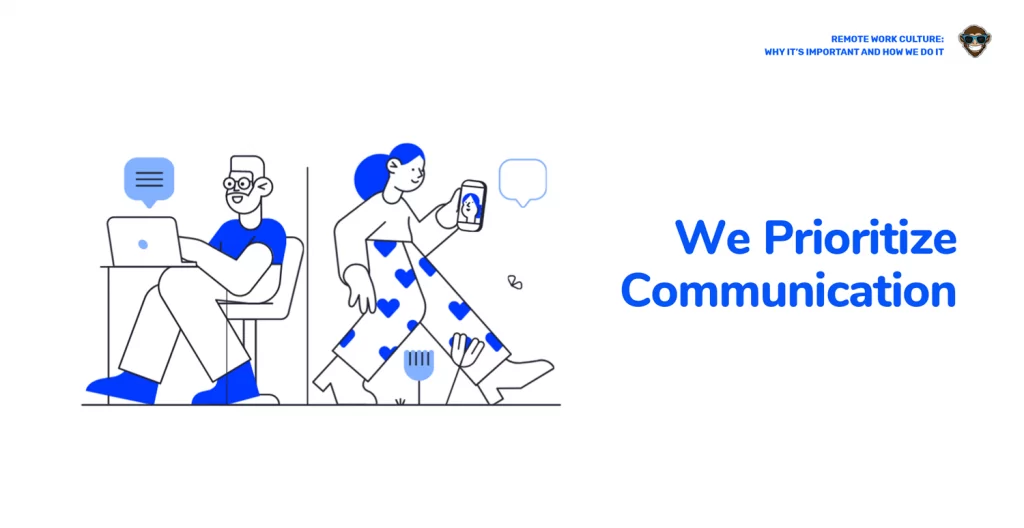
We Prioritize Communication
The most important principle, communication, is crucial if you want to enforce a remote work culture. Working from home doesn’t mean that your employees are flying solo or on their own. If they feel this way, their job performance might take a big hit. A remote team isn’t likely to achieve success if their members don’t communicate amongst themselves or with management when they have to.
The success of building a remote work culture is highly dependent on the degree to which your team members can communicate clearly and productively. And while it’s true that remote communication is probably not the same as it is in a traditional office setting, there are tools to help you make virtual communication highly effective and on-par with face-to-face engagement. We recommend using the leading communication tools available to everyone, such as chat apps, video conferencing, and project management tools. At Foonkie, we use Google Hangouts, Google Docs, Google Drive, Zoom, and Slack to conduct meetings, share documents and files, or talk about relevant tasks and teamwork situations to ensure everyone is on the same page.
We also use Whatsapp and other chatting tools to discuss more simple and straightforward matters faster and efficiently. We like to use Trello and for task and project management, depending on the size of the project. These tools allow our development teams to collaborate and organize workflows defined by the Scrum Master or Product Owner. For code management and programming, we use GitHub or , among others, because they make the code visible to the entire team, allowing developers to collaborate, correct, propose, review, and create a sustainable remote workflow. We also use tools such as InVision for collaborative design and LastPass for security and password management. All these tools, and more, enable real-time collaboration, automate specific tasks, and eliminate the need for in-person meetings and supervision.
Also, by establishing safe and durable communication channels with your team, you can avoid getting stuck in repetitive tasks, reduce or avoid mistakes, mentor and guide new or confused employees, and keep your workflows optimal and smooth. This way, your employees can perform their jobs under the umbrella of a healthy environment that helps them overcome difficult situations with ease. It’s also crucial you acknowledge the differences in the way your employees learn and work. Some of them are more tech-savvy than others; some aren’t as talkative, others are too talkative, so adapt and adjust your communication strategies to include everyone’s differences and create an inclusive environment. Additionally, effective communication can also enforce your work culture because it creates a rapport between team members and helps keep your company’s values and vision clear and enforceable at all times.
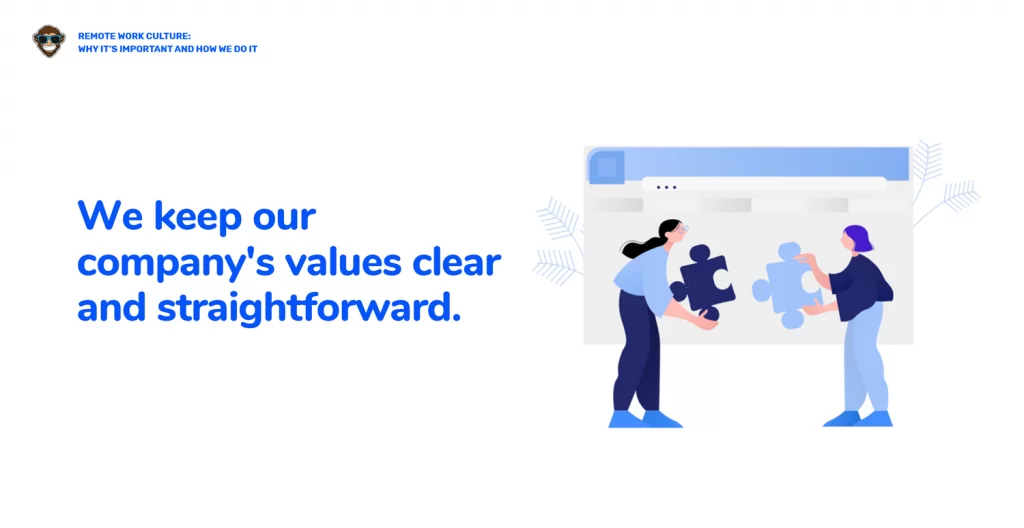
We keep our company’s values clear and straightforward.
One of our founders’ first things considered when engaging in remote work culture was which values and vision said culture would promote. Establishing these concepts firsthand will help you prioritize and select the best tools and methodologies that will facilitate remote work. It will also help your employees–and outsiders for that matter–get a clear idea of what your company stands for and shape your work culture to create a consistent, safe environment for your remote workers. They will, in turn, have a moral compass that can lead their decision-making, incentivize them, and drive employee engagement through the roof. Additionally, keeping your values clear will educate your clients on your identity and give them a sense of confidence and wholesomeness, hard to maintain with remote teams.
In our case, we have built a set of values focused on innovation, integrity, teamwork, and quality. We also believe in measuring success and efficiency by objectives fulfilled, not hours worked (more on this later). Since day one, we have embedded these values into our company’s DNA and implemented them in every part of our day-to-day operations, with both our employees and our clients.
We believe that if you have a great set of core values and enforce them, your remote employees will always be ready to go the extra mile and give their best to get things done. We also believe in the importance of building an environment where good work is recognized and incentivized, which creates a flexible and supportive environment for everyone. Our experience shows that all these elements increase productivity and enhance flexibility, adaptability, and agility. In turn, our employees have a chance to evolve and grow so we can always have the best experts and deliver the innovative, robust products that define us.
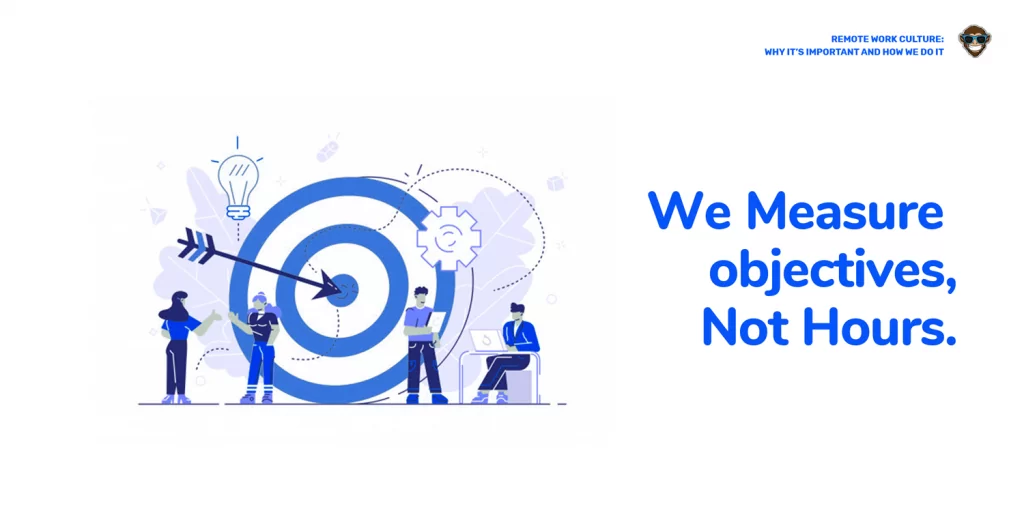
We Measure objectives, Not Hours.
People often wrongly assume that the number of hours an employee spends at work is equal to the effort, interest, and level of accomplishment they possess. In our ten-year trajectory, we have learned this can’t be farther from the truth. In reality, the most significant ideas and most challenging tasks are executed in spurts, not in long hours. Moreover, the value of those ideas lies in objective fulfillment, not in the hours the employee spends in an office. We have also learned that the best, most creative ideas often happen in seconds; they do not require a lengthy conception, and the most productive days are rarely the longest.
But still, most managers that adhere to the traditional 10-hours-a-day schedules measure employee performance with an eye on the clock. You’ll only cause morale decline and high employee turnover with rigid working hours because they’ll eventually get bored and leave. Measuring success by hours worked is not sustainable long-term for any enterprise, especially for development companies where creativity is crucial.
At Foonkie, we measure success by objectives fulfilled, never the hours spent on a chair or in front of a computer. Our employees’ performance is measured by their ability to get work done and done well, even if it took them 1 or 100 hours to complete. In a remote work culture, you must give employees the power to decide when and how they complete their work, and as long as they do it and deliver high-quality work, nothing else should matter. Don’t micromanage, ever! Placing importance on hours and presence over results will only lead to inefficiency and unnecessary headaches. Remember: when you feel forced to meet a schedule, you’ll eventually begin to hate your job.
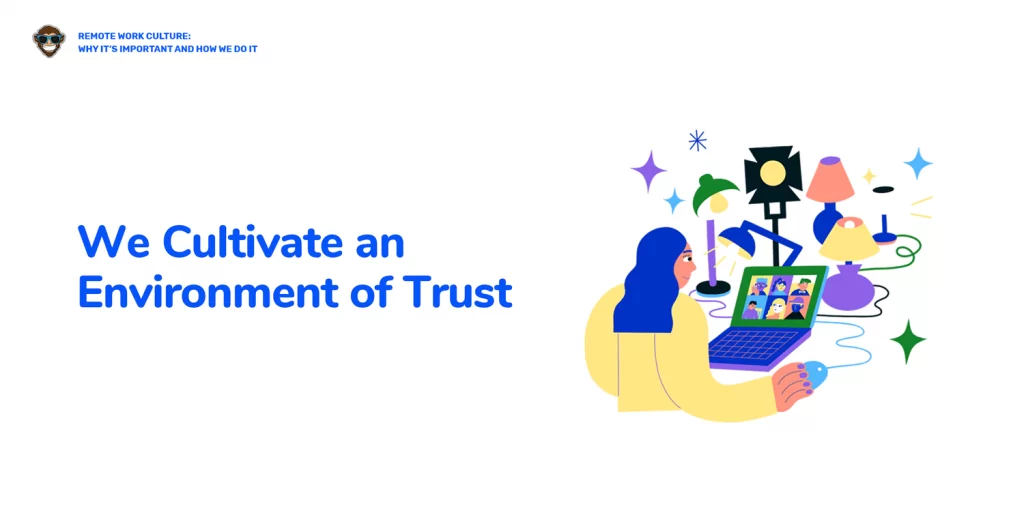
We Cultivate an Environment of Trust
This point is crucial and non-negotiable. If you want to build a remote work culture for your development company, you must trust your employees blindly. There is simply no way around it. For one, because you can’t physically be next to them supervising their every move, but because it isn’t realistic for management to look over every single staff member all the time, every day. Even if you’re a super manager, you can’t sustainably do that forever; you’ll go crazy. Hence, the beauty of trusting your team.
If you follow the principles we’ve listed in this article, your employees will genuinely want to do an excellent job without supervision. They’ll feel connected to your company and their position that guarantees their performance to be transparent and efficient. Motivated employees work twice as hard and are more likely to engage with management and teammates better. Consequently, these interactions can also increase trust because workers get more visibility within the company and feel a sense of belonging they won’t want to break. Trust also leads to better communication to make higher-level decisions with your team instead of on your own, which lets employees know that you trust them to be a part of the decision-making process.
Nonetheless, if trusting your employees is challenging for you, we suggest you find alternatives to keep an eye on them without stifling their performance. As stated above, you have tools like Trello, Google Drive, Google Hangouts, and Slack to stay updated and in touch with your employees’ progress and tasks. You can start by using these tools to establish accountability and monitor behaviors and, in time, as trust is built, slowly wean off constant supervision. This approach will allow you to transition from a state of constant overlooking to a trustful environment where workers are responsible for fulfilling their tasks.
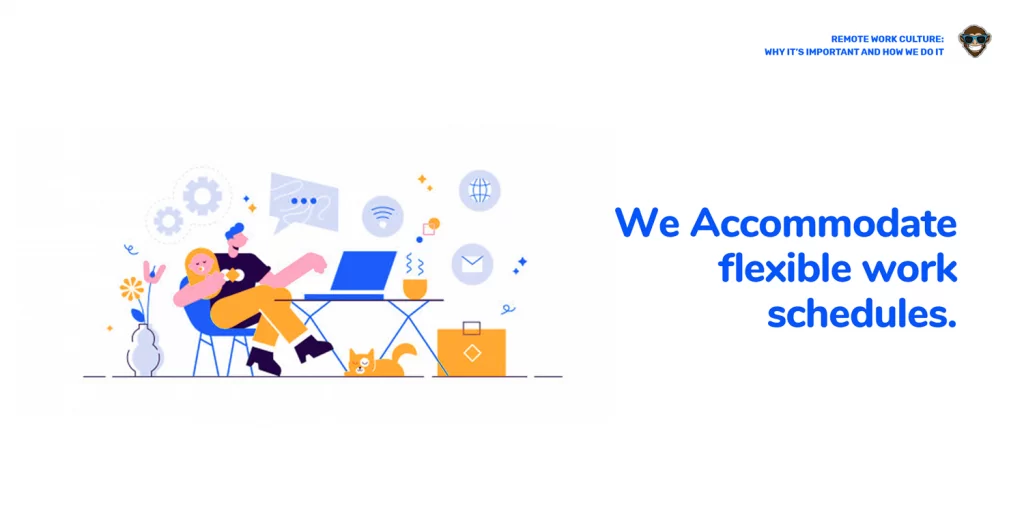
We Accommodate flexible work schedules.
According to Buffer’s State of Remote Work Report, 40% of remote workers consider flexible scheduling as the top benefit of working from home. And that number doesn’t lie. Reaping the benefits of remote work while tying employees to a fixed 8-hour schedule is highly counterproductive, even more so for development companies like ours that usually outsource their personnel via offshoring and nearshoring. Under these hiring schemes, you must consider the different time zones and circumstances inherent to the diversity of your outsourced workforce. It’s unfair to demand a fixed work schedule from employees who often live on opposite sides of the world from both you and their coworkers. Not only is it unfair, it’s unrealistic for management to think they can control employees who live in different time zones. The amount of time, resources, and physical exhaustion this will cause will undoubtedly hamper your company’s productivity.
In turn, we suggest you ditch the 8-hours-a-day mentality and stick to trusting your employees to manage their own time. If you enforce transparent and sustainable remote work practices, your workflows will be smooth because employees get incentivized to get things done. There’s no better way to promote productivity, show respect and understanding, have happy employees, and ultimately successfully enforce your long-lasting remote work culture.
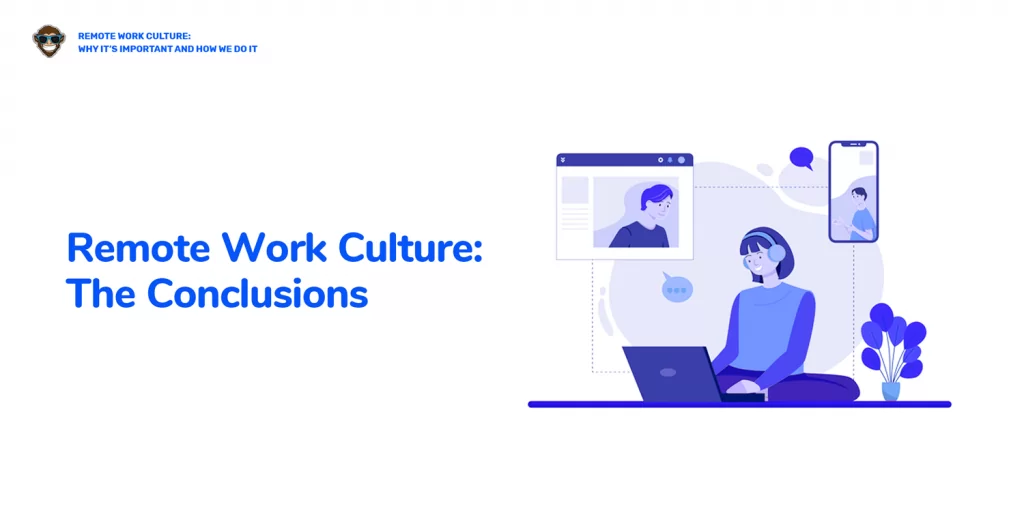
Remote Work Culture: Final Thoughts
Work culture is the backbone of any development company that seeks to enforce a remote workplace. The remote working trend is rising exponentially and lays the groundwork for a future where more people will work from home than in an office space. The benefits of this phenomenon are all too many to count and range from protecting the environment to saving commuting times and costs that workers can employ in more meaningful endeavors. All these benefits stem from the flexibility, well-being, and peace that individuals get when they can work from a space of their choice. Moreover, and considering that remote work will most likely be the norm in some years, enforcing it from now will give your company a head start and help other companies follow suit.
We’ve had our fair share of challenges during our journey into a fully remote workforce, but with consistency, hard work, and transparent practices, we’ve had the success and leadership that has taken us ten years to build. If you want us to work on your project or have any questions regarding this topic, don’t hesitate to contact us!
